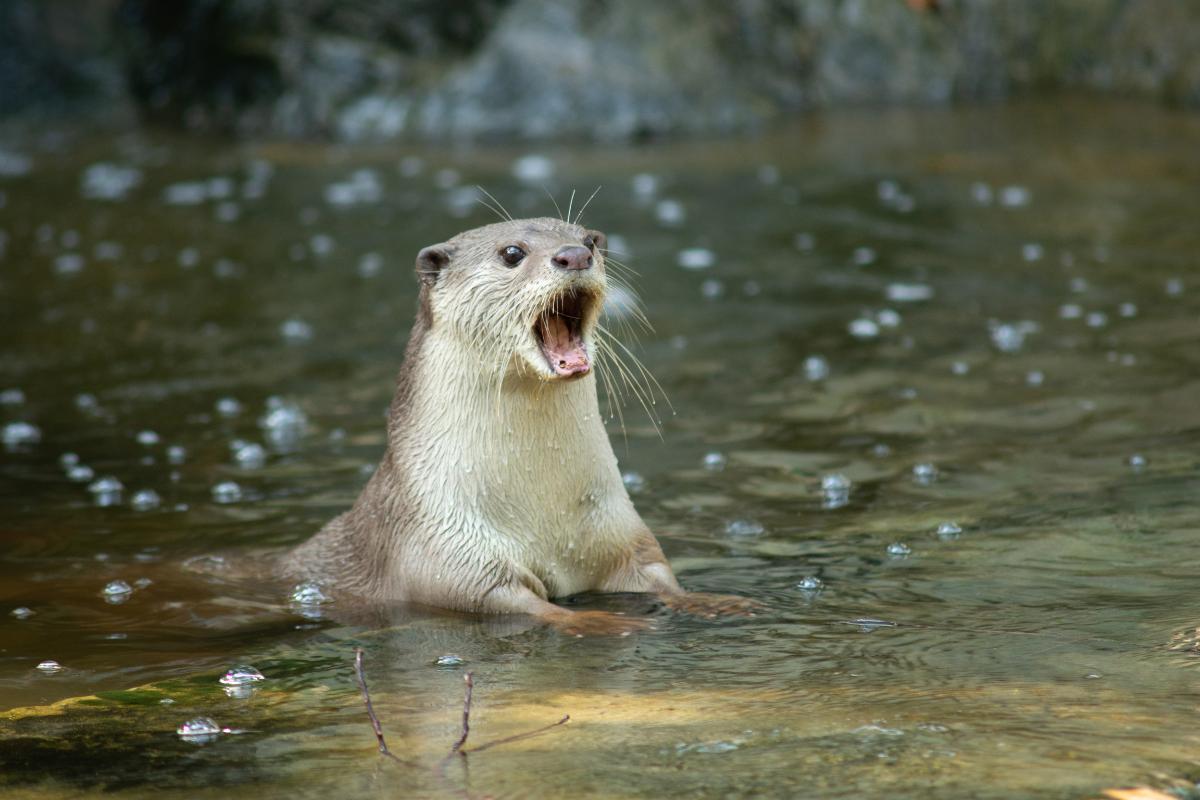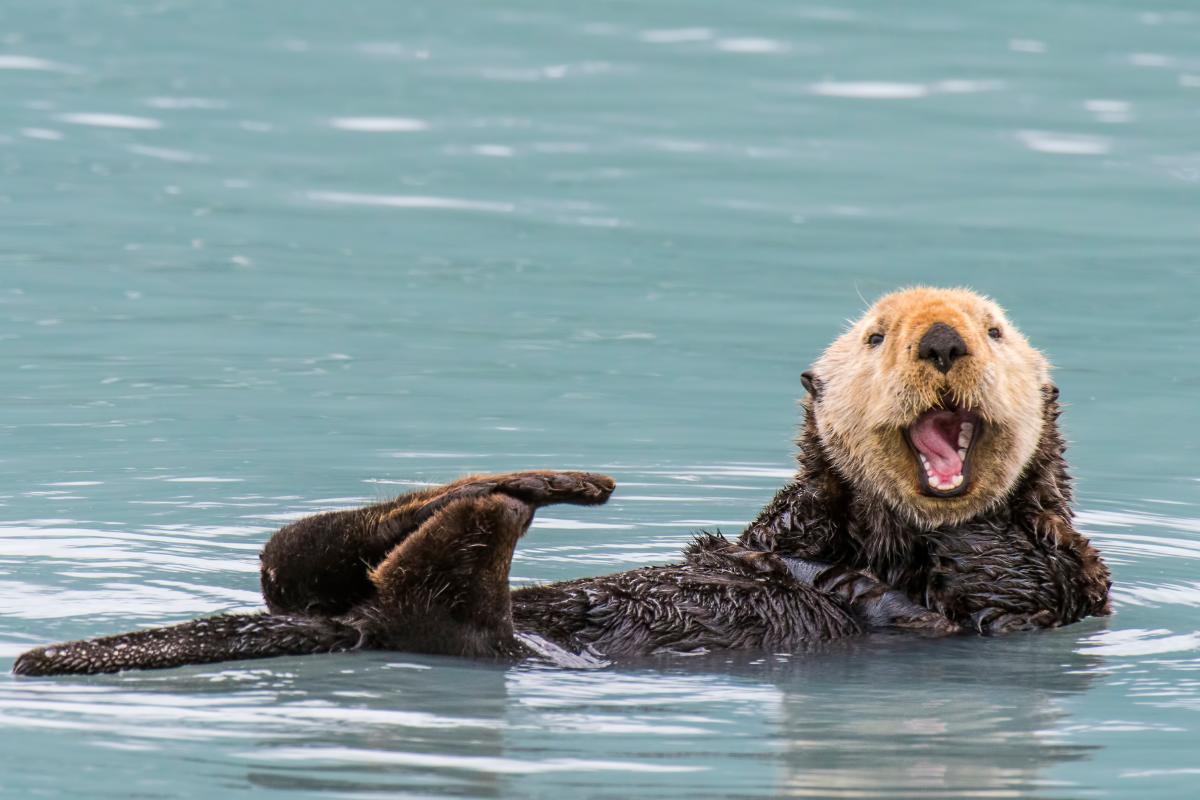Are Otters Dangerous? - Aggressive Otters


Otters are not generally dangerous or aggressive towards humans, but this can depend on the individual otter. They are wild animals that have not been domesticated. This is unlike dogs and cats which have millennia of domesticated between them. While there may be some tame otters, it is important that we make the distinction. Moreover, there are different types of otter species, such as giant otters, sea otters and river otters. These otters are from various genera in the subfamily Lutrinae and can have variations in behavior as well as physicality.
With this in mind, AnimalWised asks the question are otters dangerous? In answering this question, we look at why an otter might be aggressive and what this says about the relationship between humans and otters.
Are otters aggressive?
In general, otters are not considered aggressive or dangerous. They are curious, playful and social animals that usually maintain a peaceful attitude. As with any interaction with wild animals, there are certain factors to take into account.
One of the reasons people may question whether otters are dangerous is due to videos online of unprovoked attacks. There are instances where otters have been very aggressive with humans, but it is important to look at the circumstances.
Otters can become defensive if they feel threatened or cornered. This is most common during the breeding season or if they are actively taking care of their young. In such situations, otters may display defensive behaviors to protect their young or themselves. Additionally, if an otter feels provoked or harassed, they may respond defensively.
For all this, it is important to remember that otters are wild animals and should be treated with respect and caution in their natural environment. Many of the attacks are either provoked or unwitting. Since otters are undoubtedly cute and fascinating, many of us want to go to them and see them up close. This can be interpreted as a sign of aggression and the otter attacks out of defense.
The majority of interactions with otters are positive and offer the opportunity to observe these animals in their natural habitat. If you do see one in the wild, it is recommended to maintain a safe distance and not try to get too close. This will help avoid any potentially stressful situation for the animal and to ensure the safety of observers.
Discover more about the different types of otters you might encounter in the wild and their respective habitats with our related article.
Why are otters said to be dangerous?
As stated above, the perception that otters can be dangerous is sometimes based on misunderstandings or isolated incidents. Here are some reasons why otters could be said to be dangerous or aggressive:
- Territorial defense and pup protection: otters are territorial and may become defensive if they feel their territory or pups are threatened. As we mentioned before, in such situations, they may display aggressive behaviors to protect themselves or their young.
- Biting and scratching: although otters do not typically attack humans, it can occur in stressful or unfortunate occasions. When this happens, they may bite or scratch as a defense mechanism. Their teeth and claws can cause wounds which can be deep. They are not lethal on their own, but it is very important they are cleaned immediately. Inoculations for rabies, tetanus or other infectious diseases may be necessary[1].
It is important to note that, generally speaking, otters are not considered dangerous if they are treated with respect and observed from a safe distance in their natural habitat. Most negative interactions occur when humans get too close, disturb their environment or attempt to interact inappropriately with these wild animals.

Are otters dangerous to humans?
Generally speaking, otters do not pose a significant danger to humans. These aquatic mammals usually avoid direct contact with people. Like any wild animal, they can display defensive behaviors in situations where they feel threatened.
As we mentioned before, defending their territory and protecting offspring are factors that could lead otters to act more aggressively and become defensive. In exceptional circumstances, they may bite or scratch to defend themselves. Although these situations are rare, it is essential to remember that otters are wild animals and must be respected if we find them in their habitat.
Learn how otters sleep in our related guide.
Are river or sea otters more dangerous?
As we have already stated throughout this article, otters are not considered dangerous in general. They usually mind their own business and only attack when provoked. However, there are certain differences between sea and river otters. These may influence the likelihood of an attack:
- Social group: sea otters are known for living in larger groups than river otters. Although river otters do interact with others, they generally tend to be more solitary. This infers you are less likely to be attacked by a group of river otters than sea otters.
- Mating: sea otters are known for mating with one partner, often mating for life in the same couple. River otters are much more polygamous and will mate with different partners throughout the year. A male river otter can have multiple litters throughout the year.
- Family unit: sea otters commit to one pup at a time, forging strong family bonds. River otters are more solitary and the males usually ignore the pups. Female sea otters are devoted mothers, although pups are only dependent on them for their first six months.
- Territoriality: generally speaking, river otters such as the giant otter are more territorial than sea otters. This is partly due to their polygamous nature and will fight to find a mate. This does not mean they are more aggressive to humans, although they may be in a more territorial mode if we encounter them.
With these factors in mind, it is difficult to determine whether a river otter is more aggressive than a sea otter. Part of the equation is access. Depending on the size of the freshwater river or lake, it may be that we have greater access to river otters than sea otters. Sea otters will often be in the open water or on rocks further from the coast. Regardless, neither sea nor river otters are considered dangerous animals.
Discover more about how otters live with our article on what is the lifespan of otters?

Should you keep an otter as a pet?
Many people ask whether an otter is dangerous because they want to keep them as a pet. This is something we advise greatly against. Otters are not domesticated animals. They should be left in the wild where they can be free. It is possible that an otter adopted from the time they are young may become tame enough to live in a home, but this is not preferable to being in their natural habitat. Adult otters will not adapted well to the home environment.
Keeping an otter as a pet is also practically very difficult. They need a lot of space and a sufficiently large body of water to stay happy and healthy. If we try to keep them in a house or apartment, we are denying the kind of life they deserve.
Otters are very rambunctious and playful. While they may not mean any harm, they will be very disruptive in the home. Their dexterous paws allow them to enter cupboards and other spaces, opening food and generally being inquisitive. They have a lot of energy and are most active at night. The amount of food and special equipment you need also make them very expensive to care for.
In addition to the practical factors, we should not encourage keeping otters as pets due to conservation. If there is a growth in the desire to keep pet otters, this can lead to poaching of already threatened species. It also can lead to otter puppy farms which will be detrimental to the well-being of these creatures.
Learn more about this subject with our article on whether you can keep an otter as a pet and watch the video below:

If you want to read similar articles to Are Otters Dangerous? - Aggressive Otters, we recommend you visit our Facts about the animal kingdom category.
1. Cheng, M. P., Parkes, L. O., Paquette, K., Yansouni, C. P., & Lee, T. C. (2016). River otter bite in a 52-year-old woman: managing animal bites. CMAJ: Canadian Medical Association journal = journal de l'Association medicale canadienne, 188(17-18), E513–E516.
https://doi.org/10.1503/cmaj.160032
- Arellano Nicolás, E., Sánchez Núñez, E., & Mosqueda Cabrera, M. Á. (2012). Distribution and abundance of the Neotropical otter (Lontra longicaudis annectens) in Tlacotalpan, Veracruz, Mexico . Mexican Zoological Act, 28(2), 270-279.
- Casariego-Madorell, M. A., Sánchez, R. L., & González, G. C. (2006). Basic aspects of the ecology of the river otter (Lontra longicaudis annectens) for the coast of Oaxaca. Mexican Journal of Mastozoology (Nueva Época), 10(1), 71-74.
- Guerrero-Flores, J. J., Macías-Sánchez, S., Mundo-Hernández, V., & Méndez-Sánchez, F. (2013). Ecology of the otter (Lontra longicaudis) in the municipality of Temascaltepec, state of Mexico: case study. Therya, 4(2), 231-242.
- Laurentino, I. C., Sousa, R. T., Corso, G., Lobao-Soares, B., & Sousa-Lima, R. S. (2023). Behaviors of the Solitary Neotropical Otter (Lontra longicaudis) in Communal Latrines. Aquatic Mammals, 49(3), 265-273.
- López Fernández, L. M. (2020). Feeding behavior of the neotropical otter Lontra longicaudis, in the Shocol River Valley, Amazonas.
- Nakano-Oliveira, E., Fusco, R., dos SANTOS, E. A., & Monteiro-Filho, E. L. (2004). New information about the behavior of Lontra longicaudis (Carnivora: Mustelidae) by radio-telemetry. IUCN Otter Specialist Group Bulletin, 21(1), 31-35.
- Riedman, M., & Estes, J. A. (1991). The sea otter (Enhydra lutris): behavior, ecology, and natural history. (Vol. 90, No. 14). US Department of the Interior, Fish and Wildlife Service.







